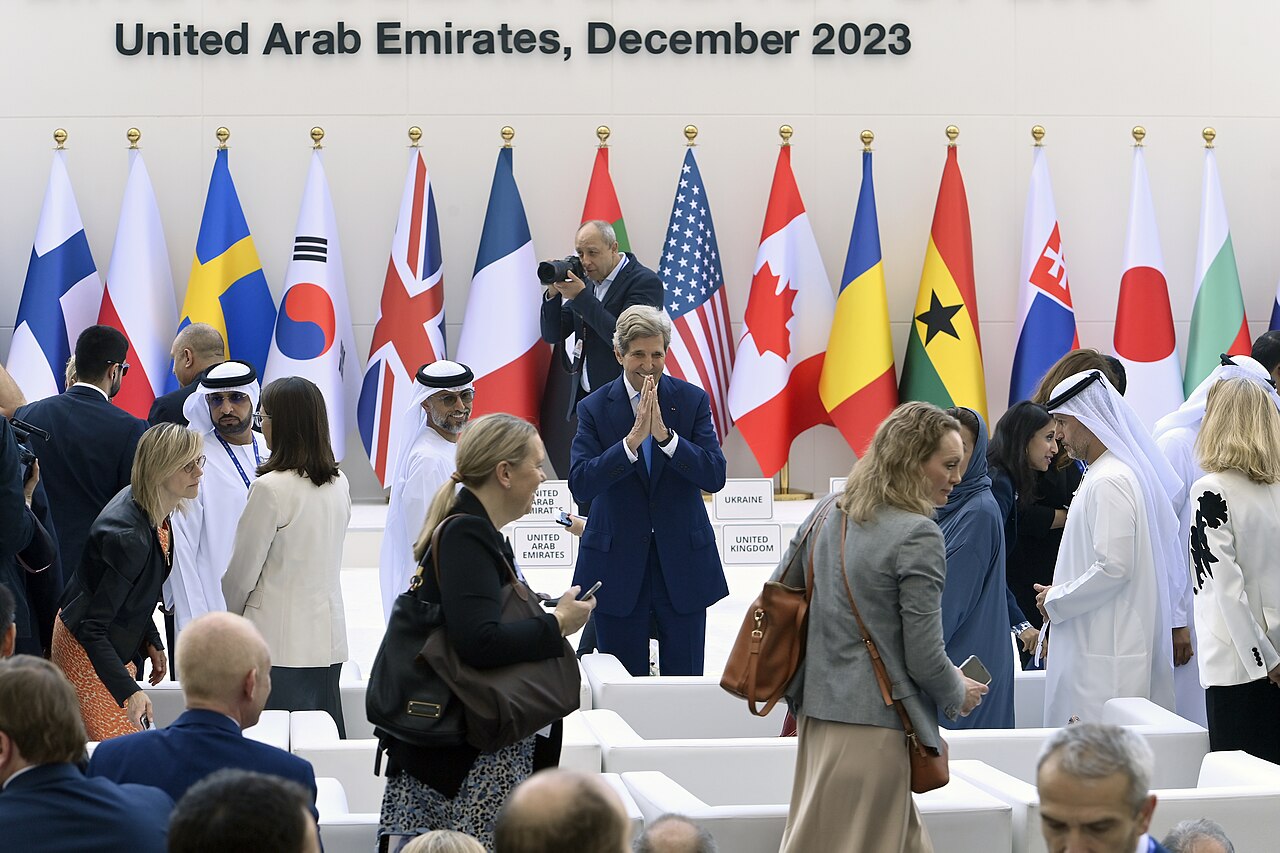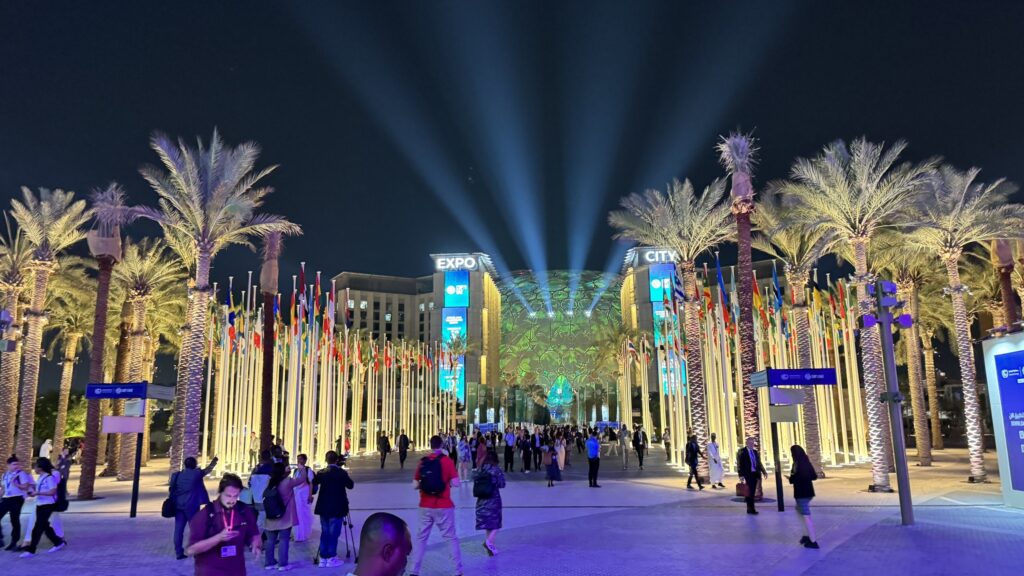
Over the previous two articles of this series (which you can read here and here), I have walked you through the development of the IPCC and the UNFCCC and have given a brief explanation of some of COP28’s key outcomes; now, to bring the series to a close, I want to offer you some of what I learned as a virtual delegate to the conference back in December. Whereas the previous articles relied upon peer-reviewed papers and official documents, this one shall be more of a collection of my own thoughts, opinions and reflections. I hope that, perhaps in some small way, it shall be of interest to you.
I attended COP28 on a ‘virtual badge’ – essentially a ticket which allowed me to sit in on some of the negotiations via livestream from my home in Cornwall. This badge was given to me by ClimaTalk, an accredited observer organisation for whom I was monitoring developments on a few key areas, including climate finance, nature and the Global Stocktake. It was a privilege to be part of their dedicated, youth-led team during the conference and I urge you to go and take a look at what that team produced.
The opening plenary of COP28 commenced at 1pm GMT on the 30th of November – or, rather, it was supposed to. Just a few minutes before the scheduled start, the plenary was delayed. Sat at my desk in the UK, frantically refreshing my computer for want of news, I had no idea what was going on; somewhat reassuringly, a flurry of messages from a friend who was attending in-person with FFF Germany soon told me that nobody else had any idea, either. Almost immediately, it seemed, the conference was getting off to a bad start. However, this concern soon gave way to unexpected optimism: when the plenary finally began at 2pm, it was revealed that the delay had been necessary to finalise the creation of the Loss & Damage Fund – a significant climate justice victory which you can read more about in article two.
Thus began two weeks of frantic activity. COPs include a wide variety of meetings and events, some of which are negotiations about policy language and some of which are presentations designed to inform participants. Many of these events overlap or take place simultaneously, so it’s impossible to attend them all and prioritisation becomes the key. A snapshot of my calendar from the week of the conference would show you just how much of a juggling act this was. None of this was helped by, shall we say, the clunkiness of the COP28 virtual platform I was using: many meetings which should have been livestreamed weren’t, whilst many which were livestreamed were cut off part way through. I soon learned that I needed to have a back-up meeting to attend should my initial plan go awry. This was incredibly frustrating, not least because it made it hard to keep track of how the key decision texts were developing.

Tracking the development of the Global Stocktake – the key decision text coming from the conference – was far and away the most interesting of my tasks as an observer. That said, the negotiation format was hardly thrilling: no witty, Sorkin-esque dialogue, just a moderator directing an endless succession of national representatives to offer their comments on the current state of the policy language. Whilst not exactly cinematic, this process was nonetheless revealing. It was fascinating to see how different countries’ priorities manifested themselves in the discussions: island countries wanted more support for adapting to sea level rise, arid countries wanted to talk about water scarcity and countries which produce fossil fuels wanted to limit any mention of phasing-out coal, oil and gas.
At various points, negotiations seemed to splinter along ‘developed country vs developing country’ fault-lines, with the former keen to avoid blame for historical greenhouse gas emissions and the latter seeking restitution for the loss and damage they had incurred. Progress was slow, incremental and far from linear – for each negotiation session, a new draft of the language was first written and then picked apart, ready for the next draft to take its place. One can only imagine how galling this process must have been for the authors of these drafts, particularly as ambitious language was watered-down or removed in its entirety. Amusingly, the moderators for these negotiations began to sound ever more like frustrated teachers as the conference wore on, endlessly corralling their students and trying to hurry things along so that class could end on time. On a couple of occasions, moderators referred to the ‘UNFCCC five minutes’ – a beleaguered, tongue-in-cheek description of a break which was scheduled for five minutes and ended up taking fifteen. Still, the Global Stocktake slowly began to take shape.
At this point, it is important to add that decisions on policy language aren’t only made in transparent, formal meetings. A key feature of negotiations throughout the UNFCCC’s history has been so-called ‘corridor diplomacy’ [1]. In essence, ‘corridor diplomacy’ refers to the discussions which take place between or at the side of meetings – either between representatives from different countries or between these representatives and non-state actors, like activists and lobbyists. The UNFCCC’s official term for these meetings is ‘informal informals’ and they are incredibly challenging for observers to track, even whilst on the ground in-person. Climate activists – whose access to country representatives can be limited at the best of times – must build trust and strong working relationships with negotiators in order to keep abreast of developments in these discussions [2]. The outcomes of COPs can be heavily influenced by such opaque processes.
At COP26, for instance, a last-minute back-room discussion between only a handful of representatives saw a call for the “phase out” of coal power reduced to a “phase down” [3,4]. This discussion – between China, the EU, India, the UK and the USA – was prompted by China and India’s opposition to the “phase out” language included in the initial draft of the Glasgow Climate Pact; the two countries threatened to abandon proceedings unless their demands were met, to the great disappointment of many other countries including COP26 host, the United Kingdom [3]. I couldn’t tell you what developments might have come from ‘corridor diplomacy’ and ‘informal informals’ at COP28 – although we certainly have evidence that such discussions took place. On the 6th of December – around a week into the conference – the Organisation of the Petroleum Exporting Countries (OPEC) sent letters to 23 countries urging them to “reject any text of formula” that called for the phase out of fossil fuels, prompting furious backlash from climate activists when those letters were leaked to the press [5,6].
By Daniel Tucker-Bailey
References
1 – Chasek P (2021) ‘Is It the End of the COP as We Know It? An Analysis of the First Year of Virtual Meetings in the UN Environment and Sustainable Development Arena’, International Negotiation, 28(1):37-68, Accessed 27/02/2024, https://doi.org/10.1163/15718069-bja10047
2 – Bowser G, Templer PH, Ho SS, Green SA, Hautzinger S, Zhu-Maguire I, Connaughton A, Dundon L, Husic D, Urban M (2023) ‘The fierce urgency of now: integrating the youth voice at COP’, Frontiers in Ecology and the Environment, 21(4):164-165, https://doi.org/10.1002/fee.2627
3 – Mathiesen K (13/11/2021) ‘The last-minute coal demand that almost sunk the Glasgow climate deal’, Politico, Accessed 09/11/2023, https://www.politico.com/news/2021/11/13/coalglasgow-climate-deal-521802
4 – Glasgow Climate Pact (2021), Accessed 09/11/2023, https://unfccc.int/documents/310475
5 – Carrington D (08/12/2023) ‘Opec rails against fossil fuel phase-out at Cop28 in leaked letters’, The Guardian, Accessed 08/12/2023, https://www.theguardian.com/environment/2023/dec/08/opec-rails-against-fossil-fuel-phase-out-at-cop28-in-leaked-letters
6 – Abnett K, Volcovici V, Saba Y (09/12/2023) ‘COP28 clashes over fossil fuel phase-out after OPEC pushback’, Reuters, Accessed 09/12/2023, https://www.reuters.com/business/environment/opec-members-push-against-including-fossil-fuels-phase-out-cop28-deal-2023-12-09/
